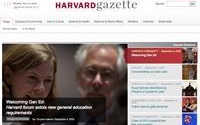Two scientific papers authored by research teams based out of the same Harvard Medical School-affiliated laboratory and published by two separate biology journals were retracted within weeks of each other on charges that material that appeared in one paper had already been printed in the other.
The two papers, which examined the role that compounds called endocannabinoids play in blood cell production, were found to have “multiple instances of duplicate (redundant) publication of data, text, and images that are nonessential to the paper,” according to a June 24 retraction notice that appeared in the journal Blood. The journal had published one of the articles in its Jan. 20 edition.
The other paper was published in the Nov. 12 edition of the Journal of Biological Chemistry. In a notice dated July 8, the journal said that the article in question “has been withdrawn by the authors,” without giving a reason for the withdrawal.
Generally, journals expect authors to submit original data for publication. Guidelines from the International Committee of Medical Journal Editors prohibit undisclosed redundant publication, arguing that it distorts the corpus of research by making the conclusions of one study seem more accepted than they actually are.
Both research teams were led by principal investigator Hava K. Avraham, the senior author of the papers and an associate professor of medicine at the Harvard-affiliated Beth Israel Deaconess Medical Center.
A message to Avraham was not returned, and several of the researchers could not be reached by telephone. An employee of the Journal of Biological Chemistry referred inquiries to its publications director, who could not be reached. The editor-in-chief of Blood, through a spokesperson, referred to comments she gave to the Boston Globe.
The retraction and withdrawal were originally reported on the blog Retraction Watch. Cynthia E. Dunbar, Blood’s editor-in-chief, told the blog that a reader spotted the duplicate material. The two papers were submitted concurrently for publication, she said, meaning that editors could not have noticed the redundancies at the time of review.
Most of the authors of each paper are associated with Harvard-affiliated institutions, including the Dana-Farber Cancer Institute, the Harvard Stem Cell Institute, and Beth Israel.
Beth Israel is currently investigating this instance of redundant publication, the hospital’s research integrity officer said.
“When the matter was brought to our attention, we initiated a review process in accordance with both our institutional policy and federal regulations,” Randy Mason, the vice president of research operations, said in a statement. “The details on any ongoing review are confidential.”
A 2009 Journal of Medical Ethics study that surveyed editors-in-chief of science journals found that redundant publication was the ethics issue that concerned them the most, beating out data fabrication and conflicts of interest. The study also found that instances of redundant publication are believed to be on the rise.
Both Blood and the Journal of Biological Chemistry have policies that prohibit redundant publication.
—Staff writer Naveen N. Srivatsa can be reached at srivatsa@fas.harvard.edu.
Read more in News
As Relocation Moves Forward, Charlesview Residents Remain DividedRecommended Articles
-
DOOR DROPPED: Blog Stands Up To The CrimsonTruth be told, Doordropped didn’t think we’d have to turn the mirror on ourselves this early in the game—but some
-
 Young and Modern
Young and Modern -
Harvard Pushes Open AccessHarvard and four other of the nation’s most prominent research universities are collaborating to make a major push for open
-
 Harvard Gazette Retools Itself
Harvard Gazette Retools Itself -
Emma Watson to Harvard Voice: "Rictusempra!"The Harvard Voice was really excited when it realized that the Harvard-Brown football game might mean a visit from "Harry
-
Harvard Professor Takes Leave of Absence after Internal InvestigationHarvard psychology professor Marc D. Hauser has taken a year-long leave of absence after University officials found evidence of scientific misconduct in his laboratory, the Boston Globe reported.













